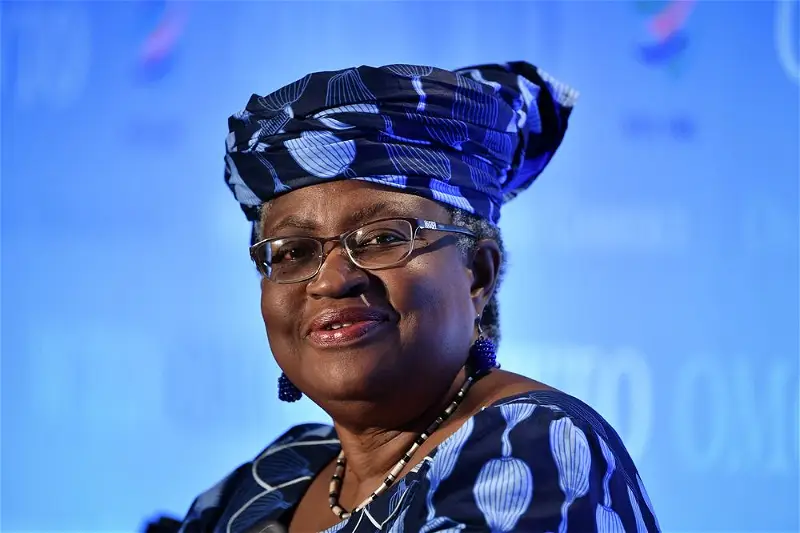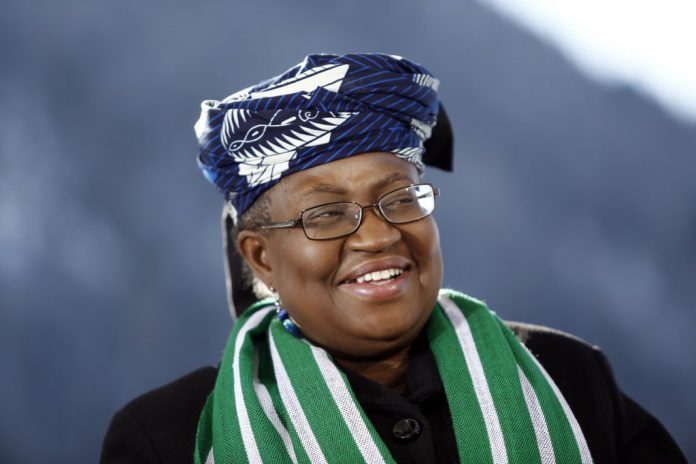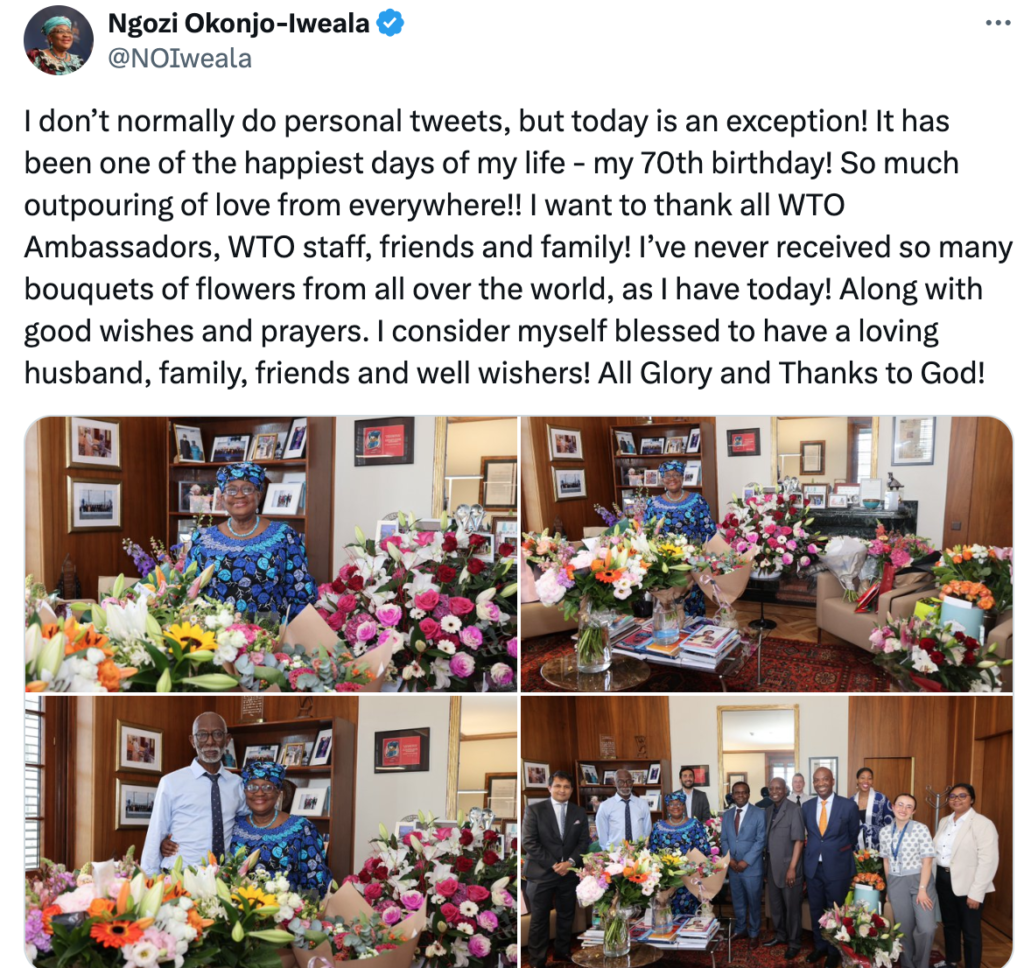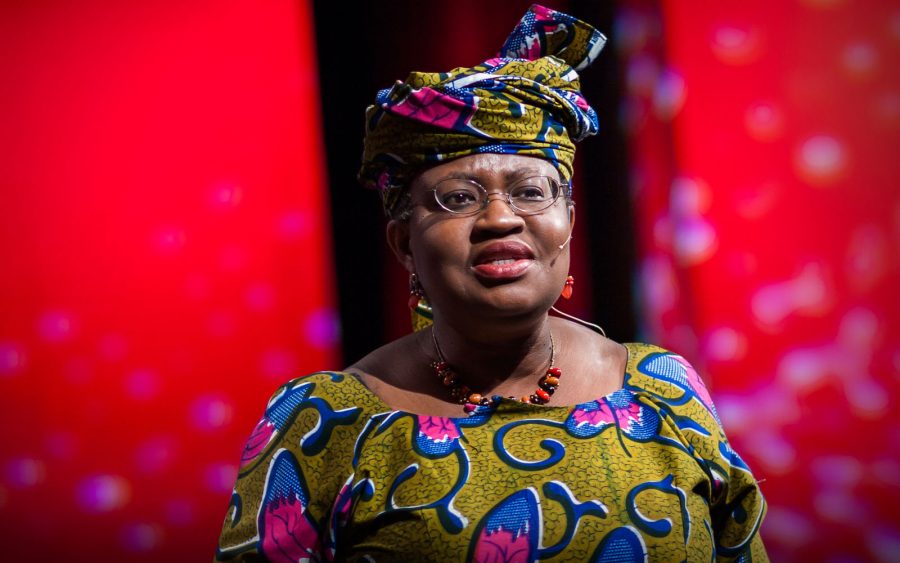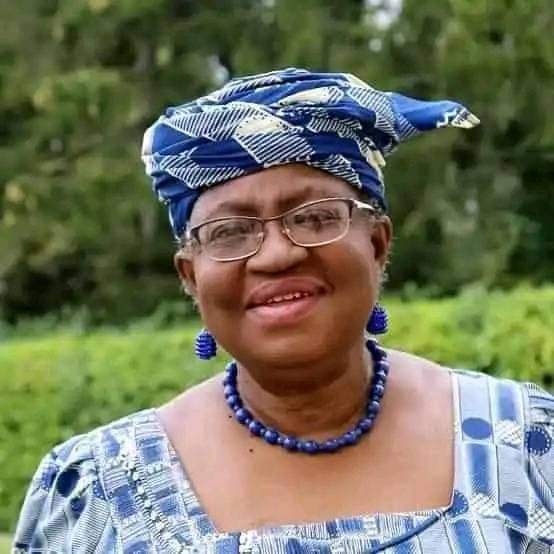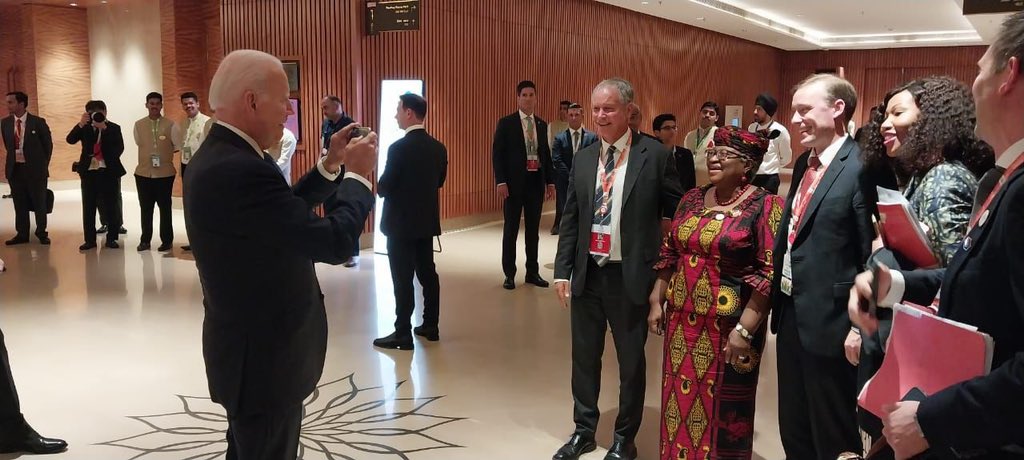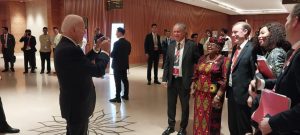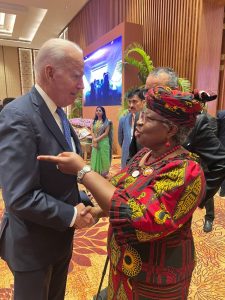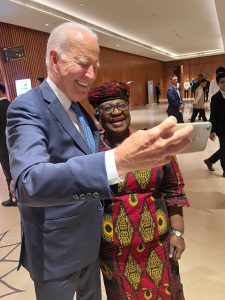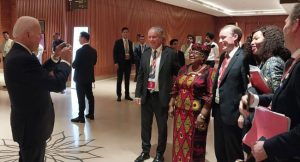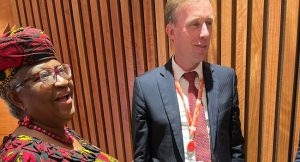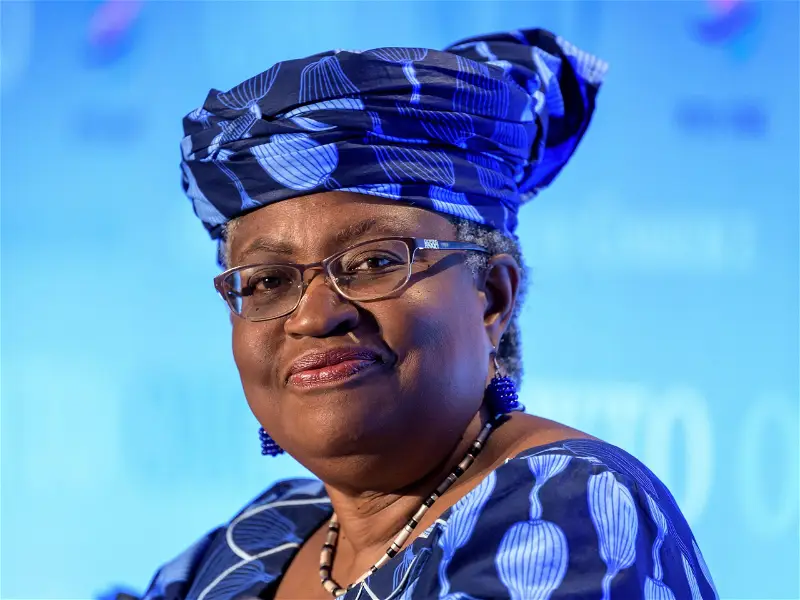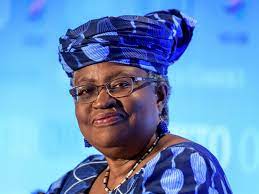Currently , interest rate for treasury bill is at an all time high of 17.5% for 90 days, while 180 days rate attracts 19%. With the juicy offer becoming once again available in Nigerian market, international portfolio investors are falling over each other in their quest to pick up a piece of the pie. The renewed appetite for Nigerian treasury bills by international investors is reminiscent of the days of Dr Ngozi Okonjo-lweala, first as the finance minister(2003-7) under former president Olusegun Obasanjo and later as the coordinating minister of the economy (2011-15)during the tenure of Goodluck Jonathan as president.
Back in the days when Nigeria’s economy was under the watchful eyes of the current Director General of the World Trade Organization, WTO , Nigeria was listed in JP Morgan index. That means our financial products were being actively traded in the international market and foreign exchange was flowing freely in and out of Nigerian economy. Hence the exchange rate of the naira to the dollar at that time was hovering around a mere N197-199 to one dollar(1$) which is way below the current N1,500 to a dollar.
But our country got dropped from the index in the aftermath of Nigeria’s then CBN governor, Godwin Emefiele banning importers from accessing foreign exchange from the Central Bank of Nigeria,CBN, for 43 items that can be produced locally.
Frowning at that policy, coupled with other measures that were stifling to foreign investment, portfolio investors exited in droves from Nigeria signaling the tumbling down of the naira the slope even as the CBN was strenuously shoring it up with practically all of our country’s income from the sales of our crude oil.
Since most of the suffocating rules and barriers to doing business are currently being changed or removed, there has been a paradigm shift which is being pursued both at the federal ministry of finance and CBN levels by President Tinubu’s administration.
It is for the reasons above that Nigerian economy is about to get some respite following a return to orthodoxy in central banking as recently revealed by the new CBN governor, Mr Yemi Cardoso and evidenced by the fact that portfolio investors are currently hot on the heels of Nigerian treasury bills and other financial products, resulting in a remarkable free flow of the dollar into Nigerian economy.
Compare 2011-2015 when Okonjo-lweala was holding sway as the coordinating minister of the economy to Buhari era (2015-2023) when novices in the management of the economy were incharge and the naira crashed to N281 and further fell to N420 before the exit of that administration from Aso Rock Villa on 29 May 2023 , and the naira current free fall to N1,500 to $1,following the floating of the naira in the past eight (8) months of the incumbent administration taking charge of affairs in our country; and it would be clear to readers why Nigerian economy is currently starved of dollars making her look as scorched as the sahara desert when it has not received rainfall in an extensive period of time.
In an interview with Aljazeera television in 2016 after Okonjo-Iweala had exited office as finance minister of Nigeria ,she revealed the secret of how she was able to keep the economy going with steady supply of dollars, hence the exchange rate was more reasonable and not volatile as it is currently.
“ lf you don’t pay attention to the fundamentals of having a stable and good exchange rate policy, inflation under control, manageable fiscal defit and debts, there will continue to be trouble in the economy”
With all the listed economic variables that the experienced financial expert warned the managers of the economy not to take for granted heading south , no wonder the Nigerian economy is in trouble, perhaps even beyond the imagination of the former Nigerian finance minister and current WTO, DG.
If there is one thing that Nigerians must come to terms with, it is that socioeconomic reforms are no tea party.If they were, the Nigerian economy would have been reformed during the first coming of then-general Muhammadu Buhari as the military Head of State of Nigeria, 1983–1985.
It was at that time, which is about 40 years ago, that the International Monetary Fund (IMF) demanded that the Nigerian economy be restructured to facilitate financial bailouts by the Bretton Woods institution.
But then the military head of state, Gen. Buhari, discountenanced the IMF and World Bank demands as preconditions for a bailout of the economy, which was in dire straits. In defiance, it resorted to trade by barter as an alternative to the prevailing world economic order.
Of course, it was a matter of a short period of time before the system proved to be unworkable as it got unraveled.
Perhaps due to the inherent flaw in the antiquated method of international transactions—trade by barter—embraced by then autocratic then-Gen. Buhari regime without subjecting it to public debate or scrutiny, before he opted to adhere to the outdated system despite its obvious mismatch with the prevailing global economic norms and prevailing trend, that the administration started experiencing hiccups.
The adoption of trade by barter by the Buhari regime was clearly further imperiled by the fact that the agencies that control the economies of the world, which are subsets of the United Nations (UN)-IMF, World Bank etc had the long reach to conspire to throw a spanner into the wheels of progress of the Nigerian economy as punishment for trying to defy the Washington Consensus, which was the prevailing economic doctrine at that point in time.
The scenario highlighted above resulted in severe hardships for the critical mass of the Nigerian population,which brought the nation to its knees and subsequently paved the way for Gen. lbrahim Babangida’s coup of August 1985, which toppled Buhari’s barely two-year-old military regime.
It is not a mere happenstance that successive administrations, both military and democratic regimes alike, have lacked the courage to introduce and implement the policy of subsidy removal on petrol and naira as demanded by global financial institutions.
Although the international lenders have been insisting that the policies are critical reforms, which they insist possess the capacity to be a game changer in the fortunes of our country by unshackling the economy from the stranglehold of the twin ogres of subsidized petrol pump price and naira, the fear of the initial dire consequences made past leaders to freeze implementation until President Tinubu emerged in Aso Rock Villa seat of power on 29 May, last year.
Put succinctly, it is on record that for a period of about forty (40) years, our numerous political leaders that have occupied and vacated Aso Rock villa seat of presidential power did not have the gumption to remove the obnoxious subsidies, which is a decision that President Bola Tinubu made ex tempore (critics might say cavalierly) in his inaugural speech on May 29, 2023.
That quip or adlib “fuel subsidy is gone“ by the president on the day he was being sworn into office appears to have literally opened the flood gate of misery and hardship that are threatening to overwhelm Nigerians.
In fact, the decision can be equated to holding a tiger by the tail, which is an extremely dangerous thing to do.
But had he not made the policy pronouncement from the get-go,perhaps his hands might have been tied and perhaps his lips would have been sealed in the manner that his predecessors had been too intimidated by the potential dire consequences of discontinuing the policy of subsidising fuel and the naira, hence they failed to act ias on the advice to eliminate the obnoxious subsidies.
Prior to President Tinubu’s decision, which can best be described as a leap of faith,as he really did not have a full sense of what the outcome of the policy would turn out to be, by his own admission,he was full of trepidation about the hardships awaiting Nigerians in the short term.
However, being conscious of the benefits that would accrue to the Nigerian masses if the policies of subsidy that have largely been benefiting the affluent while the poor were being imperilled, he opted to take the risk for the long term benefit of the long-suffering Nigerian masses.
The decision that President Tinubu made to end petrol subsidy which is a policy that had been entrenched since the mid 1980s up to May 29, 2023, of which no leader in Aso Rock Villa dared to make, reminded me of the folklore: “Who Will Bell the Cat?” In this age-old tale, citizens shied away from the daring mission of placing a bell on a wild cat terrorising the community and its livestock, signalling its approach and enabling preparation for defence.
In the wisdom of Mario Fernandez, who was born in Havana, Cuba, on February 25, 1946, and was imprisoned for political dissent by the Castro regime at the age of sixteen: “Rise above the storm, and you will find the sunshine.”
Furthermore,there is something intriguing to me about growth which is that significant growth happens only when we think out of the box. That is when something like a leap of faith happens.
Now,some Nigerians, especially critics of President Tinubu over his decision to end subsidies for both petrol and naira, believe that he placed the cart before the horse by removing the petrol subsidy before thinking of how to fix the inevitable consequences of the policy action in the form of the severe hardships currently being experienced by the long-suffering Nigerian masses.
As he has admitted, he was nervous about the decision, just as his close associates were averse to it too. Hence, it was not contained in the body of his inaugural speech, which is why he had to sneak it in ex tempore.
According to Carl Jung, the Swiss psychiatrist and psychoanalyst “The pendulum of the mind oscillates between sense and nonsense,not between right and wrong.”
Perhaps, having observed events from in and outside of government for 24 years after serving as governor for the first 8 years since the return of multi-party democracy in 1999, and especially since 2012 when he led then opposition party APC to resist the proposed petrol subsidy removal by then ruling party PDP, President Tinubu must have seen the big picture and recognized that Nigeria would benefit in the long run from the removal of petrol subsidies, despite the initial hardships that vulnerable would contend with in the short term.
As Friedrich Nietzsche, the German philosopher posits:”Silence is worse; all truths that are kept silent become poisonous.”
There was no doubt that Asiwaju Tinubu, then leader of the main opposition party, had realised that being silent about how poisonous subsidies were to the economy and people of Nigeria was not sustainable, so he was not going to sit idly and watch the country die slowly from the poison of petrol and naira subsidies.
That is why it was a matter of how long he would allow to remain hidden, the truth about petrol subsidy, which had become toxic not only to the economy but to the country as a whole. Either the entire crude oil proceeds were being used to defend the naira by the CBN or applied by Nigerian National Petroleum Company, NNPC to purchase refined products for the country with nothing left to sort out other obligations resulting in the monumental back log of FX repayments which the US Secretary of State Mr Anthony Blinken on a recent visit to president Tinubu advised Nigeria to pay off as one of the preconditions for American investors to have interest in investing in Nigerian economy.
President Tinubu had probably drawn inspiration from the courage exuded by the likes of Nicola Mendelsohn,a vice president of Meta (the parent company of Facebook), in charge of global business development for Europe, the Middle East, and Africa, when she was tapped to become the first woman president of the highly regarded “IPA” (the Institute of Practitioners in Advertising), the UK’s trade body for advertising agencies.
Sharing her experience, she wrote:
“It came down to a very basic belief: If you believe in change, you have to do it, embrace it, and be prepared to lead it.”The Facebook vice president for global business development further stated that:”The times I’ve grown the most have been the times where I’ve felt most nervous—the times that I thought I wasn’t going to be able to do it.”
Fortuitously,Nigeria has grown since President Tinubu became the number one occupant of Aso Rock villa some eight (8) months ago. Although the people are currently getting leaner, albeit temporarily, the economy is undergoing reforms and getting sturdier.
The growth is evident by the huge funds that are going into the federation account from crude oil proceeds and being shared between the sub nationals, which are currently in trillions of naira.
That is why all eyes are currently on the governors to see what they have been doing to help the masses in their domains with the quantum of funds flowing into the state government’s coffers owing to the removal of subsidies on petrol and the naira.
By the same token, activities in the stock market in Nigeria have shown significant growth, and the bond and treasury markets have also recorded remarkable increases in activity compared to this time last year.
That is because as earlier stated, the portfolio investors that were actively engaged in the Nigerian economy when Ngozi-Okonjo-Iweala (currently WTO Director General) was minister of finance and co-ordinating minister of the economy and had taken flight during eight (8) years of Buhari’s reign are fast returning to our country.
Little wonder agencies responsible for global economic viability rating of countries such as Fitch and S&P are becoming bearish on the Nigerian economy in their ratings by returning her status to B+ from B-.
Dr.Yemi Cardoso, the CBN governor, affirmed the return of portfolio investments derogatorily referred to as ‘hot money’due to the propensity for such funds to take flight out of the economy as soon as instability is noticed on the horizon, as opposed to Foreign Direct investments (FDI), which usually manifest in the form of physical investments in assets and equity on a long-term basis.
The reality is that since the Nigerian economy has not attained the maturity that would attract equity investors into ventures with strong anchors,owing to political uncertainties still inherent in our economy and country, we must make do with the so-called ‘hot money’ which guarantees continuous flow of fx into the economy enabling our country to avoid foreign exchange scarcity results in spike in naira-dollar rates in the manner that N15000 is now equivalent to $1 arising from impairments to dollar supply into our country.
As the popular aphorism goes, “half bread is better than none.” In the absence of the type of FDI such as factories that we desire,we have to make do with ‘hot money’ to tide us through.
That is the type we feconomic management matrix that had kept the economy afloat and the naira/dollar exchange rate steady during ex-presidents Olusegun Obasanjo and Goodluck Jonathan regimes, (1999-2015) with Okonjo-lweala as the coordinating minister of the economy.
The return of portfolio investors was affirmed recently the new CBN governor during a parley between our country’s economic management team and senators with oversight responsibilities for finance,banking, insurance, and other financial matters.
Here is how Cardoso put it:
“For example over the past few days,we have had over $1 billion that has come into the market, and this quite frankly has answered the question of whether our policies are working”
There is no doubt in my mind that the growth trajectory of the Nigerian economy, which is on a rebound, is a reflection of the new attitude of those currently holding sway in the finance ministry and the apex bank.Nothing attests further to that than the attention that Nigeria is receiving from multilateral financial agencies such as the IMF and the World Bank, among others, that have been making appearances in Abuja and Lagos lately. Of course one is not suggesting that our country should seallow hook, line and sinker, the policy advise coming from the IMF and World bank that are often not people friendly and therefore can imperil a government by triggering civil disobedience, as was the case in Argentina in South America and even kenya our West African neighbor. What l am advocating is that in light of the current dire financial circumstances that our country is grappling with, we must be pragmatic by not throwing away the baby and the bath water by outrightly rejecting the proposals from tye brenton woods institutions, by threading with caution in choosing policies to implement and the ones in which we need to tarry a while before acting upon them.
To be frank, the policy reforms that have facilitated the growth rebound have also had adverse side effects on the masses. In other words, the policy reforms have been brutal and have had collateral damages for the masses,but the pains were not unanticipated.
As a matter of fact, it is the fear of the misery that would befall the masses if subsidies on petrol and naira were discontinued that prevented past leaders from making the needed but painful decision.
Unlike his predecessors, President Tinubu decided to do what most astute leaders do, which is to make difficult decisions and manage the fallouts.It is in a bid to mitigate the negative effects of subsidy removal on petrol pump prices and the naira exchange rate with foreign currencies, that President Tinubu and his economic management team has been introducing some measures to cushion the harsh effects.
Apart from N25,000 (increased from N800,000), conditional direct cash payments to the most vulnerable in society, the administration also advanced N5 billion to each of the thirty-six (36) states of the federation to provide palliatives for the masses at the sub national level.
In addition, a subsidized transport system in the form of the supply of mass transit buses to ease transportation nationwide, as well as plans to resort to less expensive Compressed Natural Gas,(CNG) as an alternative to petrol and diesel as fuel for vehicles, are currently awaiting implementation.
Furthermore, upon his return from his private visit to France last week, President Tinubu directed that 102 metric tons of grains should be released from the strategic reserve to douse the rising tide of food inflation, which is estimated to be in the region of 30% or thereabouts.
Obviously, those social safety measures have not started yielding benefits or have been inadequate; hence, hunger is still raging like wildfire on grasslands. But the latest gesture of releasing grains into the market as part of the palliatives is expected to soon help tame the rising cost of food based on the simple economic principle of supply and demand.
Hopefully, by flooding the markets with gains like maize, millet, and rice, the prices that had spiked due to the influence of the cost of transportation following the removal of subsidies for petrol may become more reasonable.
Last week, Bashoroun J.K Randle, a renowned chartered accountant,former President of the Institute of Chartered Accountants of Nigeria, ICAN, and current Chairman of KPMG Africa, sent me a very terse statement about the dire state of affairs in our beloved country:
“We are in danger of STUMBLING into a toxic cocktail of financial and economic crises, political rigidities, and security disasters on account of grotesque corruption,multiple misunderstandings, and subversive miscalculations.”
Fortuitously, upon President Tinubu’s return from his two-week private visit to France, coinciding with his decision to increase conditional cash transfers from N8,000 to N25,000, as earlier stated has instructed the release of food items from strategic grain reserves. This move which aims to alleviate the hardships currently being faced by the masses due to rising food prices, as highlighted in the latest survey report by the Nigerian Bureau of Statistics (NBS), which indicates a current food inflation rate of approximately 30%, may calm the nerves of destrought masses now currently finding it difficult to continue enduring hunger pangs.
The president’s policy directive on the release of grains which came on the heels of the recent riot act read out by CBN Governor Cardoso to Deposit Money Banks, DMBs, for them to release the dollars in their vaults, which is beyond the mandatory threshold of 20% of their shareholders and customers funds in their treasury, may be positively impact food prices, especially as the option to import the commodities to augument local supply in case there is shortage is on the table.
The CBN’s enforcement of the rule that forbids banks from retaining their shareholders and customers funds beyond the threshold of 20% reduced the pressure on the naira, resulting in the Nigerian currency subsequently becoming stronger. In like manner, the price of food may be less volatile and therefore reduced when the grains are released into the market, so that a critical mass of Nigerians can go back to eating the mythical “three square meals”.
However, the elephant in the room remains the fact that the supply of foreign exchange and food has to outstrip demand.The bane of the economy and the plight of Nigerians is that the opposite is currently the case since demand has been greater than supply.To change the equation, crude oil production needs to be ramped up, and the management of it has to be more robust than it was under the watch of the immediate past administration.
It is welcome news that, from a record low of 900,000 barrels per day at some point, production has been ramped up to about 1.3 million barrels per day in the current Tinubu era.
Also, it is a timely relief that private sector involvement in managing the security function for the oil and gas assets is credited with the success story.
There is also the comforting news that the bill to make it mandatory that our country’s oil and gas assets are protected by private security outfits, as it is practiced all over the world, has attained an advanced level of debate in the legislative chambers.
The passage of the bill into law would make it statutory and validate the current reliance on Tantita Security for the job that has curbed the menace of crude oil theft that poses a huge threat to the nation’s ability to earn foreign exchange to support its budgeoning population, bogus bureaucracy, and unbridled taste for foreign-made goods and services.
It is trite to state that Nigerians need to wean themselves of their acquired taste for foreign goods and services, which is putting pressure on the naira. The CBN governor, Cardoso, alluded to that, and one has written consistently about the need for Nigerians to produce what they consume and only consume what they produce to conserve foreign exchange and even earn some, as we may soon be experiencing when the Dangote refinery for crude oil fully comes on stream.
In the agriculture and food security spheres, perhaps former President Obasanjo’s Operation Feed the Nation (OFN) initiative during his reign as military head of state from 1976 to 1979 needs to be reinacted or revisited to boost food security.But to make Nigerians go back to the land to till it, the insecurity currently stalking farmers in the hinterland has to be eliminated.
Without a doubt, the most viable way to do so is the decentralization of the Nigerian Police Force (NPF), which should be complemented by the massive recruitment of Nigerians into the security forces, particularly the police force, which is underfunded and poorly resourced, with less than 400,000 officers and men manning a country that has a population in excess of 200 million.
That urgent need for state, community, or decentralized police force is a subject for another intervention at another date. For now, President Tinubu should make haste to conclude his timeline and robust plans to reestablish forest police (formerly known as forest guards), solid minerals police, and blue economy (marine) police, which he recently enunciated.
The urgency for adequate policing is palpable as bandits and outlaws appear to be in the process of overwhelming our security forces as they have been brazenly kidnapping without mich resistance,people in the Federal Capital City, the seat of political power, and taking traditional rulers hostage and even killing them, as recently witnessed in Ekiti State.
Additionally, fiscal measures must be introduced and seen to be implemented or practiced by government aficionados to avoid creating the impression of ‘monkey dey work, baboon dey chop’ in the minds of the masses currently mired in misery, who may deem profligacy by leaders in the corridors of power as exploitative and trigger mass protests. Cutting down on the number of people in the official entourage of public office holders as recently announced by President Tinubu is a good starting point. But there needs to be more policies to eliminate imprudence in the management of our common wealth.
One is not unaware of the wisecrack “it is easier said than done,” which reiterates the fact that it is never easy to implement robust policies that may not be perceived to be people-friendly at the initial stages.
But one can find solace in the fact that, with persistence and a strong sense of purpose driven by altruism, a leader would regain the confidence of his followers and motivate them to key into his agenda of growth and prosperity for the people, as Franklin Delano Roosevelt did for the good people of the United States of America, USA, when he pulled that country out of the Great Depression in the mid-1930s following the World War.
By the same token, President Tinubu may become a hero to Nigerians like Franklin D. Roosevelt is to Americans, if he pulls our beloved country out of the economic doldrums in which it is currently stuck by applying the Ngozi Okonjo-lweala economic management matrix as part of the calculus in his Renewed Hope agenda.
Magnus Onyibe,an entrepreneur,public policy analyst, author,democracy advocate,development strategist,alumnus of Fletcher School of Law and Diplomacy at Tufts University, Massachusetts, USA, and a former commissioner in Delta State government, sent this piece from Lagos, Nigeria. To continue with this conversation and more, please visit www.magnum.ng.
